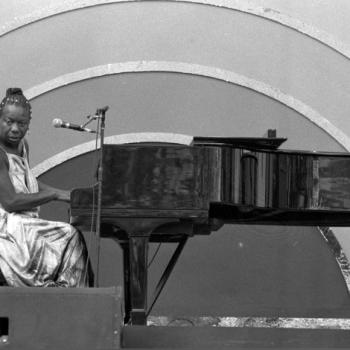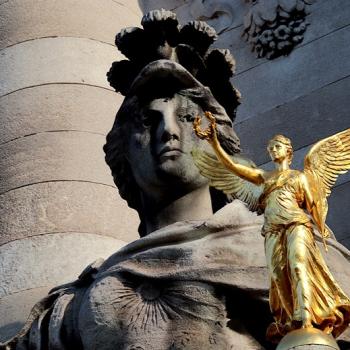When news people speak of Hollywood marriages, they often speak of those who have been married more than a few years with something that might be awe but is more likely, I think, to be surprise: "So-and-so and so-and-so have been married for almost ten years!" or "Paul Newman and Joanne Woodward were married for fifty years!!" There was a time when one might hear of a fiftieth wedding anniversary and refer to it with admiration, but the attitude for media reporters today is more likely to be one of incredulity.
Of course Hollywood isn't much of a barometer of where we stand culturally. It has never been the place to see what Americans are really like (though, unfortunately, it is that by which we most often present ourselves to others).
Looking at Hollywood one would think that Americans are overwhelmingly white, with a few people of color sprinkled here and there, that those who take religion seriously are mostly either wild-eyed fanatics or out-and-out daft (and in either case not so bright), that only a few people struggle with gay issues and that those issues are mostly fodder for humor, that most parents (usually but not always fathers) are dim-witted in comparison to their children, and that philosophy professors all wear tweed, drive a sports car, and seduce their undergraduate students. It takes little experience and reflection to know that few of us are the people most frequently portrayed in sit-coms and movies.
Though we can write off these depictions of ourselves as nothing more than the product of entertainment fluff, it nevertheless seems that media trends are often a sign of things coming. Perhaps that's true of marriage. Perhaps we are moving in the direction of marriages that last for a few years before those in them decide to remain friends but to move on. I hope not.
Marriages that do not last forever are hardly new. I'm not an avid genealogist, but I've done enough research in my family tree to know that families in the past knew divorce and abandonment. In spite of that, it seems to me that the idea of marriage has changed, and may be changing more rapidly.
Presently we tend to think of marriage as a love relation between two individuals. In that case, Janice and I married because we were in love and wanted to express that love and our expectation of its longevity publicly by getting married. Though all of those things are true, that isn't the only way to understand what marriage means, nor does it capture what happened when we married.
In a variety of cultures around the world now and in the past, marriage has been seen as an event that brings together two families and creates a relationship that undergirds the community. In such cultures, arranged marriages were often expected, and in them love might be irrelevant (though today many who still prefer to arrange marriages take love into consideration in the arrangement). But when marriage has been understood as the foundation of community, then even a marriage between two passionate lovers was assumed to be more than an expression of their love.
It has also seldom been true that marriage was a contract in the ways we usually think about contract. There were sometimes contractual elements to a marriage, but the marriage went beyond that. I enter into a contract with someone else to protect myself in our relationship: I will do this and you will do that; but if I don't, then . . . ; and if you don't, then . . . . If I rent a car, I'm entering into a brief relationship with the rental company, and we have a contract that protects each of us from the possible failures of the other.
In a marriage, however, even when there have been contractual elements, the point of the marriage was to do something more than a contract could do. We might say that the marriage relationship was covenantal because it made it possible for the married couple to do something that they could not do merely as individuals.
What that something-more was might be easily specifiable: we enter into this marriage in order to produce an heir. However, it also might not be specified so easily. It includes matters such as the creation of (ideally) stable relations in which to raise children, or the natural foundation for all ethical and political life (as in Aristotle).
Those things are true of marriage, but they tell us about its necessity or its results and don't get directly at its essence. For that, the 19th-century German thinker, G. W. F. Hegel, gets most closely to the truth of things when he says:
Marriage is essentially an ethical relationship. Formerly, especially in most treatments of natural right, attention was paid only to the physical side of marriage or to its natural character. Consequently, it was treated as only a sexual relationship . . . . It is equally crude to think of marriage as only a civil contract . . . . On such a view, the individual humans are bound by a contract of mutual wilfulness, and marriage is degraded to the level of a contract for reciprocal use. A third notion posits marriage in love alone, but this too must be rejected, because love is only a feeling and so is exposed in every respect to contingency, a shape ethicality may not assume. Marriage, therefore, is determined more precisely as rightful, ethical love . . . . The ethical aspect of marriage consists in the parties' consciousness of this union as their substantial aim, and thus in their love, trust, and common sharing of their entire worldly being. (Philosophy of Right ¶¶ 161, 173)
Hegel is right: marriage is not just about sex, nor is it merely a civil contract, nor is it merely about love—though none of those three is irrelevant to it. Marriage is an ethical relationship in which the unity of that relationship is paramount and the couple is explicitly aware of its importance.
As Hegel says, in marriage a couple shares their "entire worldly being." A married couple is a new thing, an individual with two hearts and two minds and yet, nevertheless, an individual in the root sense of that word, a living being that cannot be divided without killing it.
12/2/2022 9:09:20 PM





